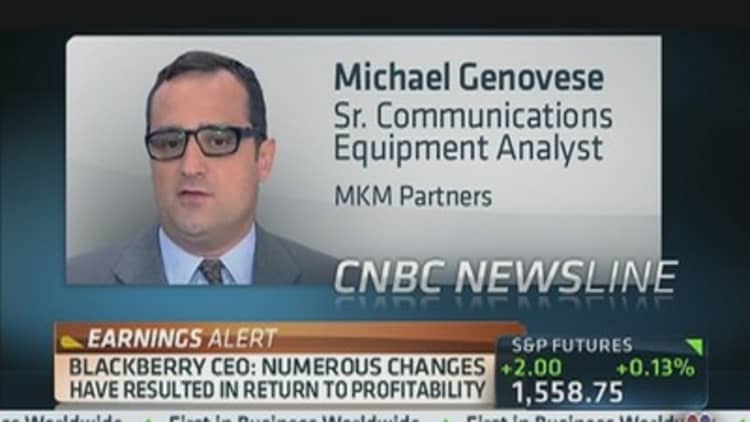BlackBerry reported quarterly earnings Thursday that outpaced market expectations, boosted in part by the launch of its new BlackBerry 10 smartphone that analysts view as a make or break moment for the beleaguered company.
The company, formerly known as Research in Motion, posted fourth-quarter earnings of 19 cents a share. Excluding items, BlackBerry made a profit of 22 cents per share, down sharply from 80 cents a share in the year-earlier period.
Those figures, however, were far ahead of what Wall Street was anticipating. Analysts had expected BlackBerry to report a quarterly loss of 29 cents a share on $2.85 billion in revenue, according to a consensus estimate from Thomson Reuters.
The company's stock has seen head-spinning volatility in recent months, as enthusiasm for its prospects waxes and wanes among investors.
Some of that was on display Thursday morning as investors took a closer look at BlackBerry's earnings, and clearly didn't like much of what they saw. The company's shares swung from a more than eight percent gain to a three percent loss in premarket trading. Shortly after the opening bell on Wall Street, the stock jumped by nearly four percent. (Click here to track the company's shares.)
Launched just days ago in the wake of a massive marketing blitz, the BlackBerry Z10 is seen as a linchpin to the company's efforts to revive its fortunes. BlackBerry said it has moved about one million of the new phones, which for the moment is a touchscreen version that mirrors the wildly popular iPhone and Galaxy virtual keyboards.
A second iteration, the Q10 that features the physical keyboard to which loyalists have become accustomed, is scheduled to hit the market in April or May. The so-called staggered launch, along with the Z10's relatively modest debut, has made some observers wonder if hardcore BlackBerry devotees might be holding out for the physical keyboard.
(Read more: Sink or Swim Time for RIM as BlackBerry 10 Launch Looms)
"We have implemented numerous changes at BlackBerry over the past year and those changes have resulted in the Company returning to profitability in the fourth quarter," said Thorsten Heins, President and CEO of BlackBerry, in a statement. This was the company's second consecutive quarterly profit.

On a conference call with analysts and reporters, Heins added that the new BlackBerry had sold through at least 2/3 of its inventory. He indicated strong demand in Canada and India, and that the company was estimating a sell-through rate of over seven million units.
Still, the Ontario-based company — whose market share has fallen far behind smartphone juggernauts Apple and Samsung, yet remains a staple for corporate users — lost subscribers at a rapid pace. The company's base of users contracted to 76 million, from 79 million.
Additionally, revenue tumbled to $2.68 billion from $4.19 billion a year ago. Handset shipments also fell overall, plunging 46 percent year over year, to 6 million.
Once the gold standard among smartphones, the newly-christened BlackBerry faces an uphill climb to reclaim the hearts and minds of consumers, many of whom have migrated to Apple's iPhone, and increasingly to Samsung's Galaxy.
Because Apple and Samsung are considered the market's top dogs, analysts are taking a very dim view of how successful BlackBerry can be in chipping away at their market share — and enticing their users to make the switch to BlackBerry 10.
On the conference call, Heins said more than half of the BlackBerry 10's users were migrating from other platforms.
"We're not surprised that the February quarter numbers are pretty good. We think the May quarter numbers will also be very good as they continue this global roll-out," said Michael Genovese, MKM Partners managing director and senior analyst.
However, Genovese said that supply chain activity indicated that BlackBerry "really over-ordered" its new phone. "The problem is if consumers don't buy these phones, they have to start backing out these profits and revenues by the August quarter," he said. "And that's what we think is going to happen."


